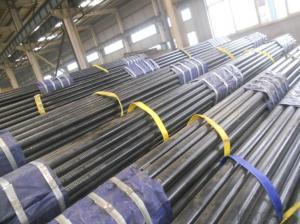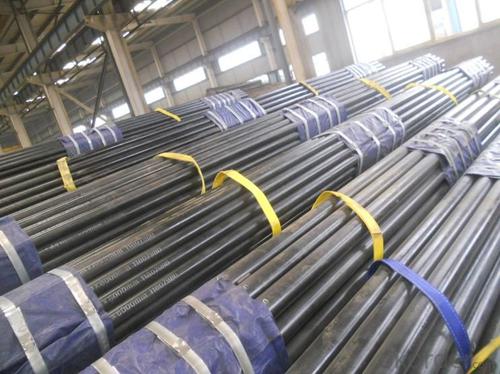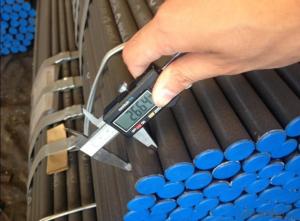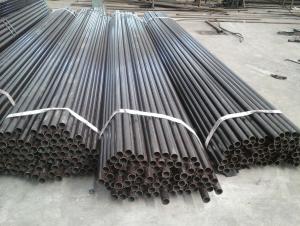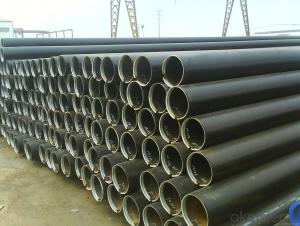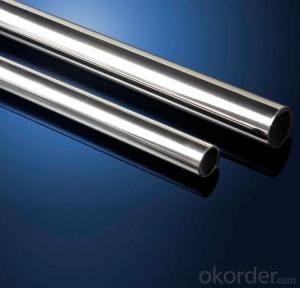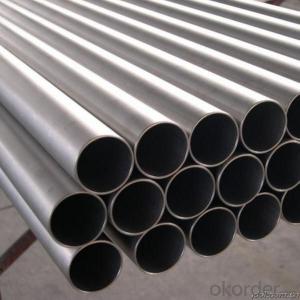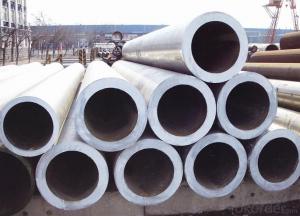Cold draw black seamless steel tube made in China
- Loading Port:
- Tianjin
- Payment Terms:
- TT OR LC
- Min Order Qty:
- 10 m.t.
- Supply Capability:
- 10000 m.t./month
OKorder Service Pledge
OKorder Financial Service
You Might Also Like
1. Commodity Name: Seamless steel pipe
2. Standard: API,GB,ASTM,ASME,DIN
3. Quality grade: 10#, 20#, A106B, A53B, API 5L B, Q235, Q345, ST37-2, ST 45, ST52.etc.
4. Dimension:
OD: 1/2"-24"
WT: 2.5-80mm, SCH10~SCH40~XXL
length: 5.8m,6m,8m,9m,12m
5. Technique: Hot Rolled/Cold Rolled/ Cold Drawn
6. application
carbon seamless steel pipes are widely used in gas, water and oil, transpotation;constructions;Bridge,highway,windows of model steel door; building materials;fences;heating facilities Fluid Pipe;conduit pipe,scaffolding pipe.etc.
7. Payment Terms: L/C D/A D/P T/T
8.packing and shipment
Packaged in bundles,as per customers' requirements, it can also bepackagesd as beveled ends, typed marking, black painting, plastic caps protection,woven bags packing
For 20" container the max length is 5.8m; For 40" container the max length is 12m. other options are available based on customer requests. Please discuss when placing orders.
9. Surface: painted with varnish;
10. Plastic caps at ends.
11. Tolerance: OD +1%/-1%
WT +12.5%/-10%
12. Chemical composition:
Models of Steel Pipes | Chemical Component | |||||||
Steel 20 (ASTM A106B) | C | Si | Mn | P | S | Cu | Ni | Cr |
0.17~0.24 | 0.17~0.37 | 0.35~0.65 | 0.035max | 0.035max | 0.25max | 0.25max | 0.25max | |
Steel45 (ASTM 1045) | 0.42~0.50 | 0.17~0.37 | 0.50~0.80 | 0.035max | 0.035max | 0.25max | 0.25max | 0.25max |
16Mn(Q345B) | 0.12~0.20 | 0.20~0.55 | 1.20~1.60 | 0.035max | 0.035max | 0.25max | 0.25max | 0.25max |
45Mn2 ( ASTM1345) | 0.42~0.49 | 0.17~0.37 | 1.40~1.80 | 0.035max | 0.035max | 0.3max | 0.3max | 0.30max |
- Q: How are steel pipes used in the manufacturing of power plants?
- Steel pipes are commonly used in the manufacturing of power plants for various purposes such as transporting fluids, gases, and steam. They are utilized for the construction of pipelines that carry water, fuel, and coolant to different parts of the power plant. Additionally, steel pipes are employed in the creation of boiler tubes and heat exchangers, which play a crucial role in the generation of steam and transfer of heat in power plants.
- Q: How are steel pipes marked for identification and traceability?
- Steel pipes are marked for identification and traceability through various methods. One common method is through the use of permanent markers or paint. These marks typically include important information such as the manufacturer's name or logo, the pipe's size and specifications, and the production date or batch number. In addition to surface marking, steel pipes may also be identified using tags or labels. These tags are usually made of durable materials such as metal or plastic and are securely attached to the pipe. They contain detailed information about the pipe, including its unique identification number, material composition, and any relevant certifications or standards it meets. Another method used for identification and traceability is the application of barcodes or QR codes. These codes can be scanned using specialized equipment or mobile applications, providing instant access to comprehensive information about the pipe's origin, production process, and quality control measures. Barcodes and QR codes offer a more efficient and automated way of tracking and tracing steel pipes throughout their lifecycle. Furthermore, some steel pipes may have embossed or engraved markings directly on their surface. These markings are typically indented into the metal and can withstand harsh conditions, ensuring long-term visibility and legibility. The goal of marking steel pipes is to ensure their proper identification and traceability throughout their lifecycle. This helps in quality control, maintenance, and inspection processes, as well as in ensuring compliance with regulatory requirements. By having clear and permanent markings, manufacturers, suppliers, and users can easily track and trace the history and specifications of steel pipes, enabling better management and accountability in various industries such as construction, oil and gas, and infrastructure development.
- Q: How do you calculate the pipe thermal expansion for steel pipes?
- To calculate the pipe thermal expansion for steel pipes, you need to consider the coefficient of thermal expansion (CTE) of the material, the temperature change, and the length of the pipe. The CTE is a measure of how much a material expands or contracts with temperature changes. For steel, the average CTE is typically around 12 x 10^-6 per degree Fahrenheit (or 6.5 x 10^-6 per degree Celsius). However, this value can vary depending on the specific grade of steel. Next, determine the temperature change that the pipe will experience. This can be the difference between the operating temperature and the ambient temperature, or the change in temperature due to the fluid or gas flowing through the pipe. Finally, calculate the thermal expansion using the formula: Thermal Expansion = CTE x Length x Temperature Change Where: - CTE is the coefficient of thermal expansion - Length is the length of the pipe - Temperature Change is the difference in temperature For example, if you have a steel pipe with a length of 10 meters (32.8 feet) and a temperature change of 100 degrees Celsius (180 degrees Fahrenheit), and assuming a CTE of 12 x 10^-6 per degree Celsius, the thermal expansion would be: Thermal Expansion = 12 x 10^-6 x 10 x 100 = 0.012 meters (or 12 millimeters) This means the pipe would expand by 12 millimeters due to the temperature change. It's important to note that this calculation provides an estimate of the thermal expansion, but other factors such as pipe supports, restraints, and the specific application should also be considered to ensure the proper design and installation of the steel pipe system.
- Q: What is the purpose of pipe flanges in steel pipes?
- The purpose of pipe flanges in steel pipes is to provide a secure and leak-proof connection between two pipes or to other equipment, such as valves or pumps. Flanges allow for easy assembly and disassembly of pipe sections, as well as providing a means for maintenance and repairs. Additionally, they provide a stronger connection, ensuring the integrity and stability of the pipeline system.
- Q: How are steel pipes used in industrial manufacturing processes?
- Steel pipes are commonly used in industrial manufacturing processes for various purposes, such as transporting fluids, gases, and solids, as well as providing structural support. They are used to create pipelines for water, oil, and gas transportation, as well as for conveying materials like ores and grains. Additionally, steel pipes are utilized in machinery, equipment, and infrastructure construction due to their strength, durability, and resistance to high pressure and extreme temperatures.
- Q: How are steel pipes used in the water supply system?
- Steel pipes are commonly used in the water supply system due to their durability, strength, and corrosion resistance. They are used to transport water from water treatment plants to homes, buildings, and industries. Steel pipes are also used for underground water mains, as they can withstand high pressures and are less likely to leak or break. Additionally, steel pipes are often used in water storage tanks and pumping stations to ensure a reliable and efficient water supply.
- Q: What are the different methods of pipe support for steel pipes?
- There are several methods of pipe support for steel pipes, including clamps, hangers, brackets, and guides. Clamps are used to secure pipes to a structure, while hangers suspend the pipes from overhead supports. Brackets provide lateral support and stability, and guides are used to control pipe movement and prevent excessive sagging. These various methods ensure the proper installation and stability of steel pipes in different applications.
- Q: How are steel pipes used in the construction of stadiums and arenas?
- Steel pipes are commonly used in the construction of stadiums and arenas for various purposes. They are primarily used for the structural framework, supporting the weight of the building and providing stability. Steel pipes are also used for the installation of HVAC systems, electrical wiring, and plumbing, allowing for efficient distribution of utilities throughout the facility. Additionally, steel pipes are utilized for the construction of handrails, fences, and barriers, ensuring safety and security for spectators.
- Q: What's the difference between seamless steel pipe and welded pipe?
- Use, seamless steel pipe is generally used in the condition of higher use, such as temperature and pressure higher, corresponding to the requirements of stress corrosion, seamless steel pipe. With vice.
- Q: What are the different grades of steel used in pipes?
- There are several different grades of steel used in pipes, including carbon steel, alloy steel, and stainless steel. Carbon steel pipes are commonly used for general-purpose applications, while alloy steel pipes are often used in high-temperature and high-pressure environments. Stainless steel pipes are known for their corrosion resistance and are frequently used in industries such as chemical, food processing, and pharmaceuticals.
Send your message to us
Cold draw black seamless steel tube made in China
- Loading Port:
- Tianjin
- Payment Terms:
- TT OR LC
- Min Order Qty:
- 10 m.t.
- Supply Capability:
- 10000 m.t./month
OKorder Service Pledge
OKorder Financial Service
Similar products
Hot products
Hot Searches
Related keywords
